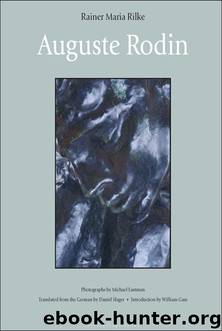Auguste Rodin by Rainer Maria Rilke

Author:Rainer Maria Rilke
Language: eng
Format: epub
ISBN: 9781935744238
Publisher: Archipelago Books
Where historical characters or material seek to live again in his art, Rodin has always had the power to reveal that which is timeless in the past. The best example of this may well be The Burghers of Calais. The historical material for this work consisted of just a few columns in the Chronicle of Froissart. It was the story of how the town of Calais was besieged by Edward III, how the English king refused to show mercy toward this town gripped by hunger, and how in the end he agreed to lift the siege only if six of its most distinguished citizens would deliver themselves to his hands, “for him to do with them as he pleases.” He demands that they leave the city wearing nothing on their heads, clad only in shirts, each with a rope around his neck and the keys to the fortified city in hand. The chronicler describes the scene in the town; he reports how the mayor, Jean de Vienne, orders that the bells be rung, and how the burghers assemble in the town square. They wait in silence, having heard the terrible news. But then the heroes among them begin to stand up, those chosen ones who feel called to die. At this point the wailing and weeping of the crowd can almost be heard in the historian’s words. He himself seems moved for a moment, as if his hand were trembling as he wrote. Then he collects himself. He names four of the heroes, but appears to forget the other two. He says of the first that he was the richest man in town. Of the second he tells us that he had power and prestige, and “two beautiful young ladies for daughters.” Of the third man he knows that he was rich in possessions and inheritance, and of the fourth only that he was the brother of the third. He reports how they removed all but their shirts, tied ropes around their necks, and set out with keys to the fortified city. He tells how they arrived in the king’s camp and describes how harshly they were received, and how the executioner had already come up behind them when his lord, upon the request of his queen, decided to spare them. “He heeded the words of his wife,” Froissart writes, “because she was with child.” That is all there is in the chronicle.
But this little material was enough for Rodin. He felt immediately that there was a moment in this story when something great happened, something that knew no dates or names, something entirely independent and simple. He turned his complete attention to the moment of their departure. He saw how these men began to walk. He felt how each of them was filled with the whole life they had lived, how each one stood there, weighted with his past and ready to carry it out of the city. Six men appeared before him, of whom no two were alike. There were only two brothers among them, and the resemblance, if any, was vague.
Download
This site does not store any files on its server. We only index and link to content provided by other sites. Please contact the content providers to delete copyright contents if any and email us, we'll remove relevant links or contents immediately.
Cecilia; Or, Memoirs of an Heiress — Volume 3 by Fanny Burney(30934)
Cecilia; Or, Memoirs of an Heiress — Volume 2 by Fanny Burney(30889)
Fanny Burney by Claire Harman(25784)
We're Going to Need More Wine by Gabrielle Union(18073)
Plagued by Fire by Paul Hendrickson(16637)
Cat's cradle by Kurt Vonnegut(13867)
Bombshells: Glamour Girls of a Lifetime by Sullivan Steve(13108)
All the Missing Girls by Megan Miranda(12748)
Leonardo da Vinci by Walter Isaacson(11903)
4 3 2 1: A Novel by Paul Auster(11049)
Adultolescence by Gabbie Hanna(8145)
The remains of the day by Kazuo Ishiguro(7551)
Note to Self by Connor Franta(7024)
Diary of a Player by Brad Paisley(6866)
Giovanni's Room by James Baldwin(5878)
What Does This Button Do? by Bruce Dickinson(5527)
Recovery by Russell Brand(4564)
Born a Crime by Trevor Noah(4511)
The Kite Runner by Khaled Hosseini(4435)
